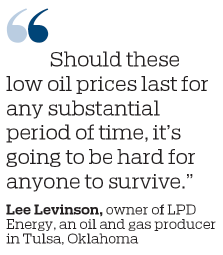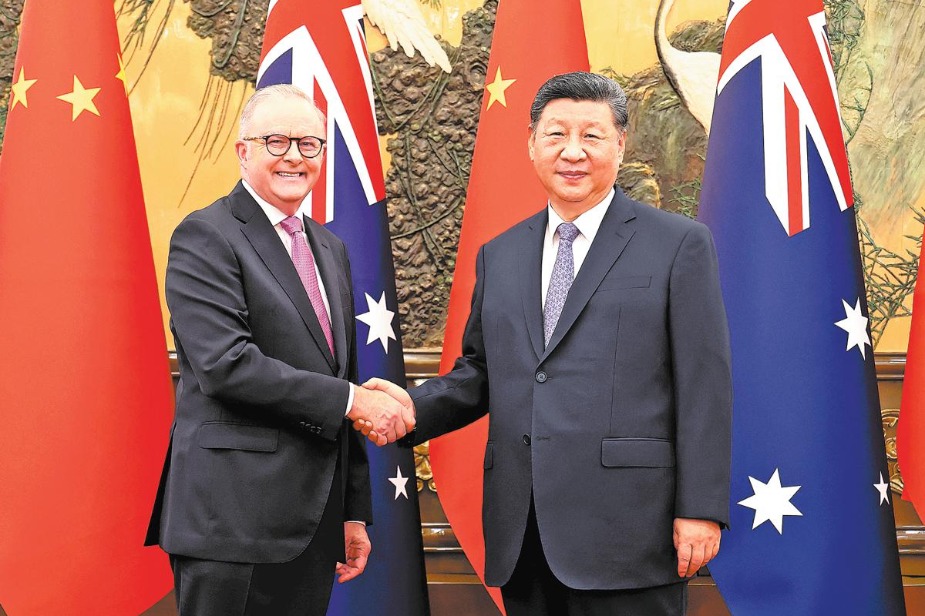US paying a high cost as oil prices plummet
With budgets hit, Trump looks to shore up sector after producers' talks delayed

NEW YORK-In Montana, a father and son running a small oil business are cutting their salaries in half. In Alaska, lawmakers have had to dip into the state's savings as oil revenue dries up.
The global economic crisis caused by the novel coronavirus pandemic has devastated the oil industry in the United States, which pumps more crude than any other country. In the first quarter, the price of US crude fell harder than at any point in history, plunging 66 percent to around $20 a barrel.
Oil prices fell sharply on Monday morning after a meeting to discuss output cuts between the Organization of the Petroleum Exporting Countries, or OPEC, and its allies was delayed, dimming hopes of swift action to support coronavirus-ravaged energy markets.
US benchmark West Texas Intermediate was down 7.8 percent at the open in Asia, trading at $26.11 per barrel. International benchmark Brent fell 6.2 percent to trade at $31.98 per barrel.
A generation ago, a drop in oil prices would have largely been celebrated in the US, translating into cheaper gas for consumers. But today, those depressed prices carry negative economic implications, particularly in states that have become dependent on oil to keep their budgets balanced and residents employed.
"It's just a nightmare down here," said Lee Levinson, owner of LPD Energy, an oil and gas producer in Tulsa, Oklahoma. "Should these low oil prices last for any substantial period of time, it's going to be hard for anyone to survive."
Crude prices recovered some ground, trading at around $28 a barrel on Friday, after a week in which US President Donald Trump tweeted that he expects Saudi Arabia and Russia will end an oil war and dramatically cut production.
Key OPEC meeting
But analysts had been sceptical about a quick resolution, and doubts only grew when the meeting between OPEC and its allies, including Russia, was delayed.
They had been expected to meet via video conference to discuss oil production cuts on Monday but the meeting has been postponed to Thursday, the government of energy-rich Azerbaijan said at the weekend.
Russia's sovereign wealth fund chief told CNBC on Monday that Saudi Arabia and Russia are "very, very close" to a deal on oil production cuts. "I think the whole market understands that this deal is important and it will bring lots of stability, so much important stability to the market, and we are very close," Kirill Dmitriev, CEO of the Russian Direct Investment Fund, told the US network.
Trump said on Sunday that he could slap "very substantial tariffs" on oil imports if prices stay low, but does not expect he will need to, since neither Russia nor Saudi Arabia would benefit from continued low prices.
When asked at a White House news conference under what conditions he would impose the levies, Trump said: "If the oil price stays the way it is... I would do that, yeah, very substantial tariffs."
On Friday, Trump met with oil executives but there were no announcements, and prices remain well below what most US producers need to stay afloat.
Among the latest casualties is Whiting Petroleum, an oil producer in the Bakken shale formation with about 500 employees that filed for bankruptcy protection on Wednesday. Schlumberger, one of the largest oilfield services companies, slashed its capital spending by 30 percent and is expecting to cut staff and pay in North America. And Halliburton, another major oilfield services provider, furloughed 3,500 of its Houston employees, ordering workers into a one-week-on, one-week-off schedule.
"You will see a tremendous loss of jobs in this industry," said Patrick Montalban, owner of Montalban Oil and Gas, based in Montana, who along with his son is slashing his salary in half and plans to cut his remaining employees' salaries by 25 percent.
The impact is far reaching. In Alaska, lawmakers recently passed a budget that sharply draws down a savings account that had been built up over the years when oil prices were higher.
Agencies Via Xinhua
Today's Top News
- Local govts urged to improve handling of hot spot issues
- China hailed as stabilizing global force
- Climate not a contest for China, US
- Beijing supports Tehran in maintaining dialogue
- Stabilizing global supply chains vital to intl market
- Visa facilitation steps boost number of foreign visitors






























